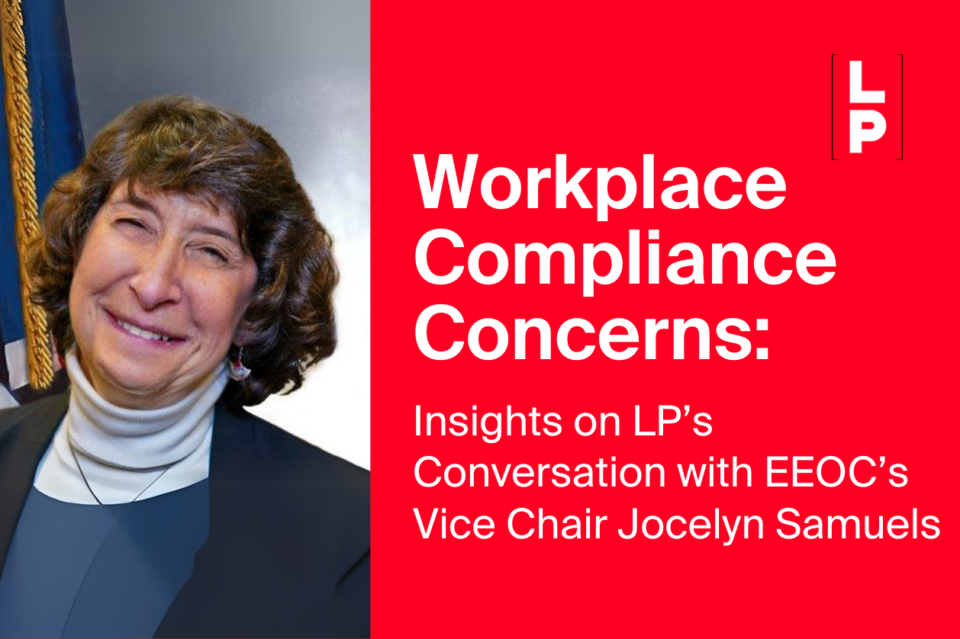Insights on Workplace Developments from LP’s Conversation with EEOC Vice Chair Jocelyn Samuels

LP hosted a fireside chat with EEOC Vice Chair Jocelyn Samuels. The Vice Chair also shared invaluable insight on the Pregnant Workers Fairness Act (“PWFA”), emphasizing that pregnancy accommodations are a significant focus of the EEOC. The discussion underscored that the process for considering pregnancy accommodations is materially different from the process for disability accommodations and requires a different analysis. Audience members also asked specific questions about the Vice Chair’s thoughts on enforcement and guidance given the changing landscape of employment laws.
Below are a few highlights from the discussion with Vice Chair Samuels.
Accommodations.
We discussed the three categories of employee accommodations: (1) disability, (2) religion, and (3) pregnancy. The discussion started off with understanding how to respond to disability accommodation requests, especially in the context of a remote work accommodation request and whether that was reasonable. The discussion delved further into the issues of essential functions and marginal functions for which employees are responsible. The Vice Chair pointed out that the accommodations process for disabilities and sincerely held religious beliefs should include a review of whether the employee’s essential functions, as opposed to marginal functions, can be completed. Marginal functions that are not essential functions cannot be relied upon to deny an accommodation.
We were also able to gain invaluable insight on the PWFA and learn that pregnancy accommodations are a significant focus of the EEOC, especially given that the regulations the EEOC published, which were finalized June 18, 2024, were mandated by Congress. The discussion underscored the importance of recognizing that the pregnancy accommodations and disability accommodations processes are not subject to the same analysis. A requested accommodation that may be unreasonable under a disability accommodation analysis may be reasonable under a pregnancy accommodation analysis. Further, the PWFA has specific limitations on when employers may request documentation. LP will be covering the PWFA further in its Annual Employment Law Webinar in September.
The Role of Diversity, Equity & Inclusion (DEI).
During the conversation with Vice Chair Samuels, we delved into the issue of DEI. Audience members raised questions about whether the heightened scrutiny of DEI programs should cause concern. Vice Chair Samuels reiterated that, despite pushback on DEI in the workplace, employers’ commitments to ensuring a diverse working population in a facially neutral manner are permissible. Employers are permitted to take steps to make their workforces representative of society, their customer base, or another specific group, but they need to exercise caution when those efforts hinge on protected characteristics like race. The employer’s goal should be to create workplaces where people from different backgrounds, socioeconomic statuses, and walks of life are represented. The best way to ensure this is through the interview process by asking questions about employee experiences.
As always, routine documentation and equal application of policies that management-level employees can reference when navigating these issues are key components of ensuring compliance.
We appreciate Vice Chair Samuels’ participation in the event. We will continue to provide updates on employment-related developments. To be kept up to date, subscribe to LP3. If you have questions, do not hesitate to reach out to LP’s Employment & Executive Compensation Group.